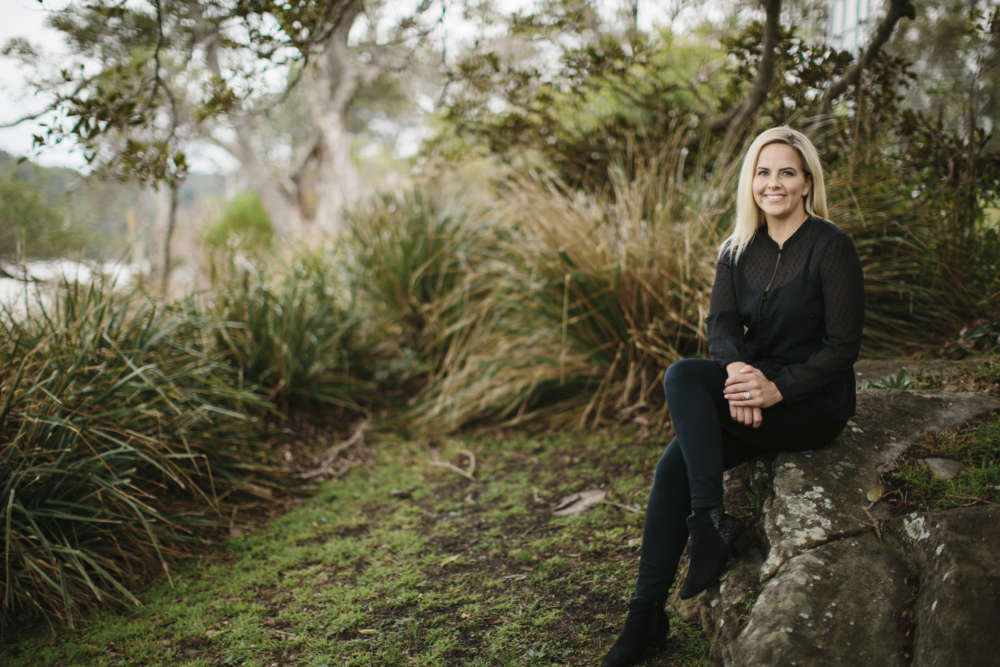This story was updated on March 10, 2023. It discusses being a death doula.
Kim Somerville looks like someone you’d expect to be working with chic designer wear at Noosa or another upmarket beach. The day we chatted at her favourite local coffee shop in Sydney’s Lilli Pilli, she wore her blonde hair tied back from her light-filled, open face. Her navy linen dress offset sparkling quartz crystal earrings and her lovely hands were groomed with a French manicure.
Why introduce Kim by talking about her personal style, rather than focusing on her work?
Because the image Kim conjures – of light, sunshine and beauty smashes the cliches that surround her work. Kim is a death doula.
And because of our culture’s stuck in the mud attitudes to death, if those attributes weren’t pointed out, you might think we were talking about someone with a dark soul, gloomy and introverted.

So that’s why it’s worth mentioning. Because Kim telegraphs unconsciously and immediately that death is part of life; that beauty can be found in those endeavours associated with death, that her work is something that a caring, interesting and very normal person can chose to do.
Kim is a wife and mother, as well as a death doula. She volunteers at her local school and enjoys being a part of her community. She has three children, the eldest of whom has just hit the challenging teen-age years. She is a proud Sutherland Shire girl, who moved there from the country when she was 10 and has never left.
“This is where I made my life. My family and friends are here,” she explains.
When Kim left school she started working in a nursing home.
“As a little girl I really loved being around elderly people and loved listening to their conversations. They always had such interesting stories, sharing details from their wonderful, long lives,” she says.
This early work prompted Kim into a career as an enrolled nurse, which she started when she was 21. In NSW enrolled nurses complete a two-year diploma course, compared to the three-year Bachelor of Nursing degree of registered nurses.
“At Sutherland Hospital on the Oncology Ward, I had my first experience of cancer and death and then, for the first time, I heard about palliative care. So a short while later I went to work as an enrolled nurse at Calvary Hospital, Kogarah.”
Calvary specialises in palliative care, which is the comfort and support of people who are suffering from life-limiting illnesses. While this suggests end-of-life, today it helps people suffering from a terminal illness who might enter hospital several times but then be discharged to go home and live fully before their next disease episode results in a need for another round of hospital care.
For the last 20 years, because of her work, Kim has encountered death on a nearly daily basis.
“I found when I was nursing people with a terminal illness, that I was very comfortable supporting their families, with talking with the people who were losing their loved one,” says Kim.
But nurses don’t have the chance to simply sit and talk, there is always too much practical work to do.
“I always wished I had more opportunity to talk to the patients but unfortunately, there’s not much time for that,” Kim explains.
Kim took about five years out from her work when her babies were born and were little. But this was more about the demands of shift work on a young family, than because she was working with the dying.
“Although there have been times when it has taken a toll. It can be hard not to take your work home. You do become attached to people and you’re sad when they die and you feel for people, for their families,” she explains.
Kim continued her career at Calvary, doing in house training and services, but no specific training for the emotional aspects of dealing with death and dying.
“You tend to learn organically, you are learning on the job. You learn by witnessing what happens and building up an ability to deal with it.”
And then, in 2017, Kim stumbled upon death doula work.
“I had never heard of it before. But I joined a local yoga class, and they were holding women’s circles. Their women’s circle put me in contact with women facilitating end-of-life doula training.”
Kim describes doula work as “practical and emotional support for end of life.” It involves home death care, vigil, funeral preparation and planning.
“I knew then that that was the perfect fit for me. I felt doula work is something I’d been searching for all along and not known about.”
During her doula work it was recommended Kim meet Victoria Spence, an established death doula, ceremonialist, counsellor and holistic funeral director with her own business, Life Rites, in Hurstville. When Kim and Victoria met two years ago they realised they could work well together.
Kim now works as a consultant with Life Rites and is learning as much as she can about the funeral side of Victoria’s work.
And because of Kim’s continuing qualifications as a palliative care nurse (she still works at Calvary), Kim can offer palliative nursing experience as part of Life Rites services.
“I never I imagined or thought about working in the funeral industry. It just kind of happened,” explains Kim.
“But I can see the need for it. From a palliative care nurse’s perspective, I can see where the gaps are. I can see the huge difference it makes in people’s lives, when they are experiencing dying, if I can fill in those gaps, including helping with funeral planning,” she says.
